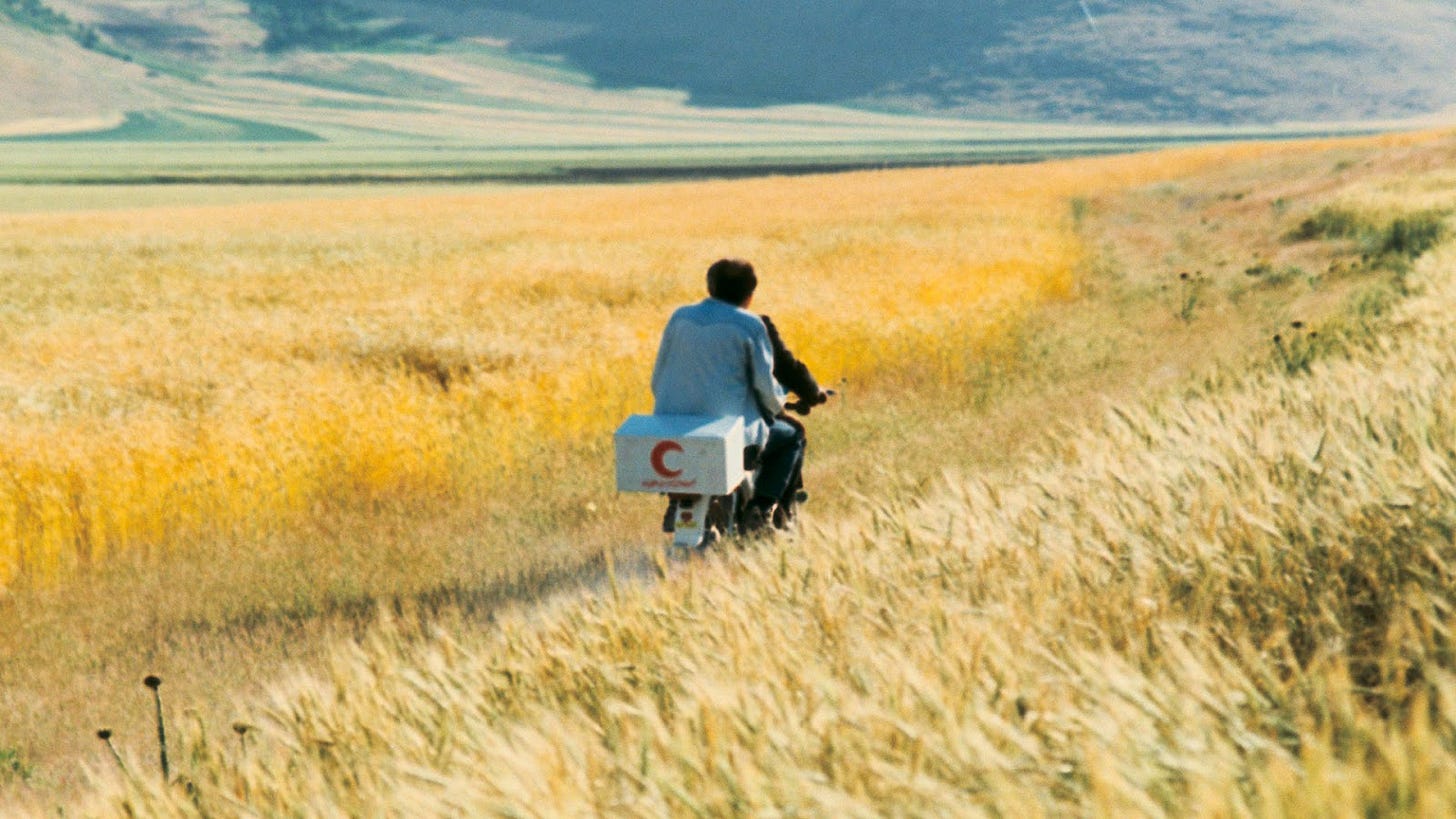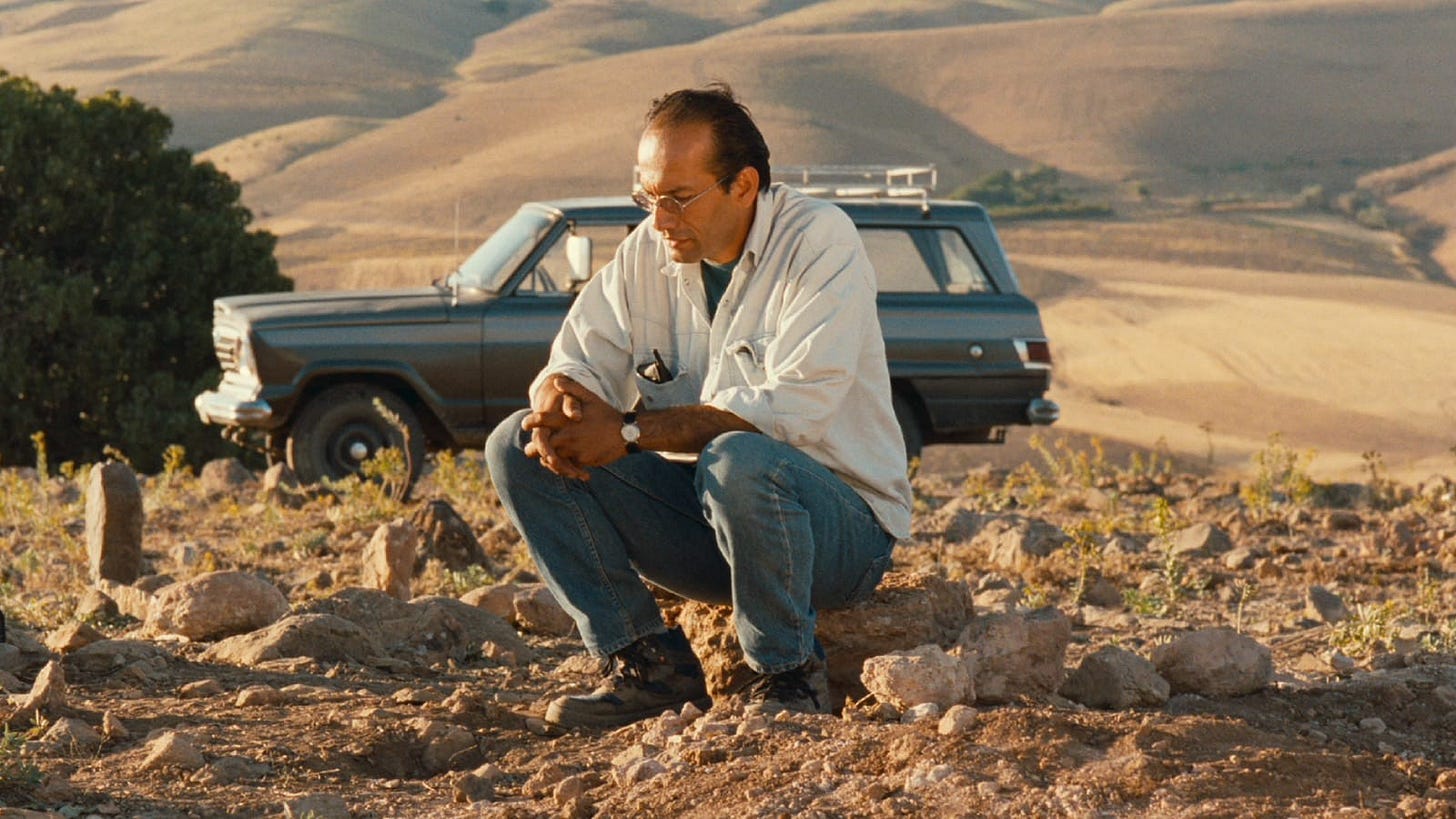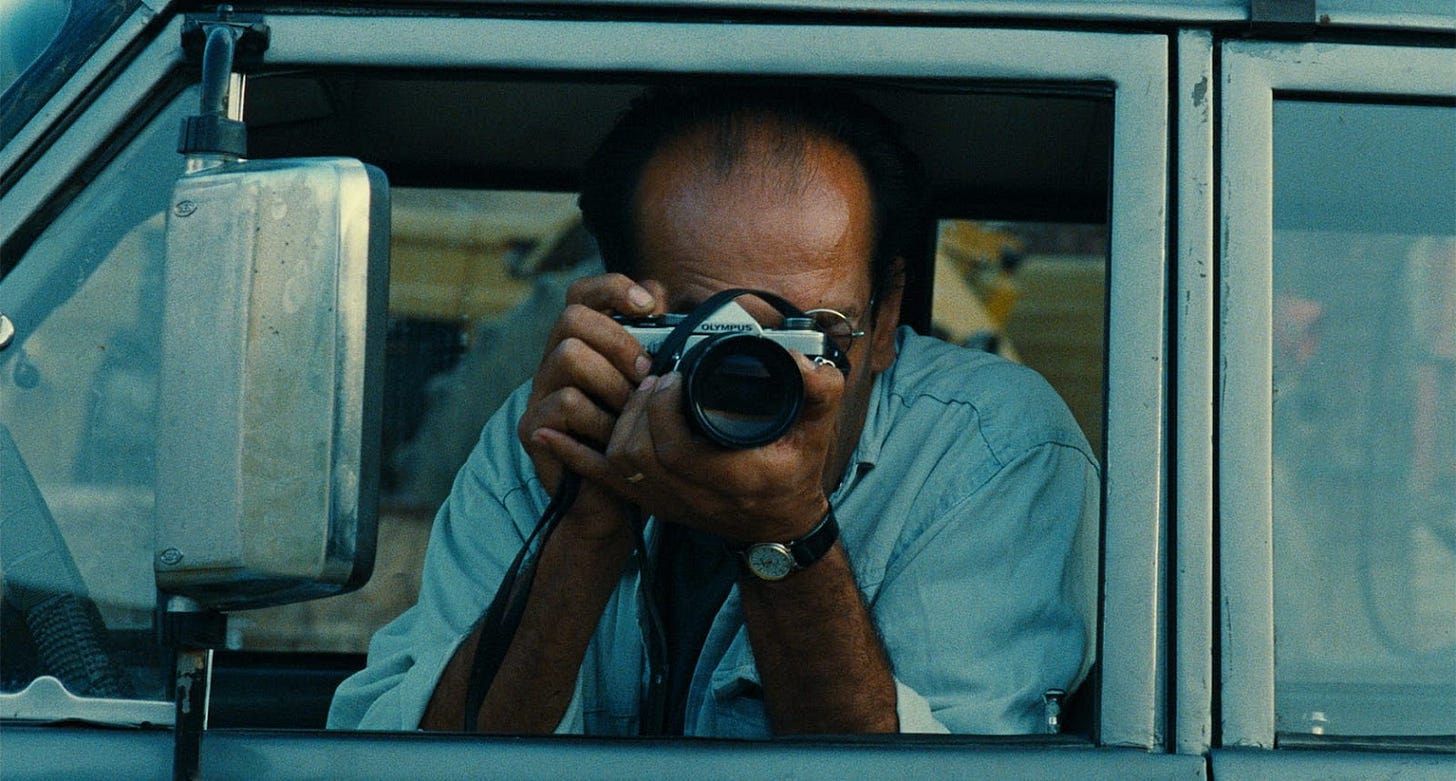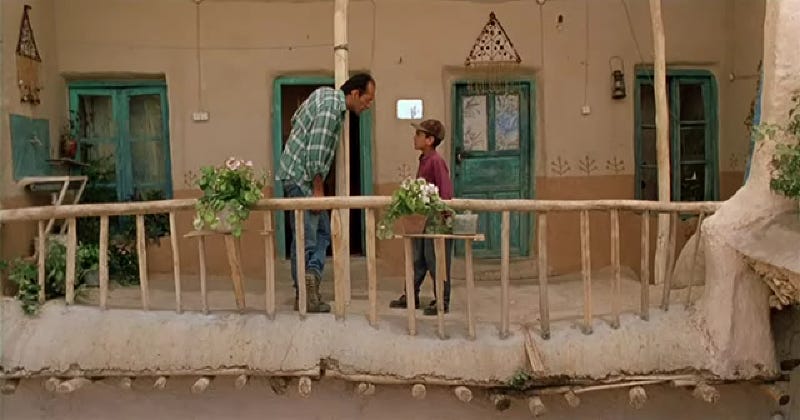Waiting for Death, Finding Life in Abbas Kiarostami’s The Wind Will Carry Us
Abbas Kiarostami’s gently profound 1999 film reminds us that life’s meaning unfolds not in plans, but in presence.
I didn’t expect to write about another Abbas Kiarostami film so soon after revisiting Taste of Cherry, but what can I say — duty calls. With The Criterion Collection’s recent remaster and release of 1999’s The Wind Will Carry Us (and my own chat about it on The Substance Podcast — more on that later), I felt pulled back to revisit another film in his body of work that’s so near and dear to my heart.
When I first watched The Wind Will Carry Us, its gentleness caught me off guard. I often find a quiet peace through Kiarostami’s work, but something about Wind felt different. Take the aforementioned Taste of Cherry, for example — a film that feels still yet vast, where death lingers over each scene in both grand and intimate ways. Wind, made just one year later, feels almost playful by comparison. Kiarostami shows us there is humor in life’s detours. A certain warmth in waiting.
The film opens with what feels like a prank. We’re placed in familiar territory (our leads driving through the winding countryside) as a group of “engineers” (read: film crew) gets lost on their way to a Kurdish village. Once they finally get there, Kiarostami gently pokes and prods at his protagonist’s intentions. Behzad (Behzad Dorani) has come to document something concrete and finite: a death. Of course, life has its own plans.
Are we truly able to open our eyes and be present when life refuses to follow our script?
The Wind Will Carry Us works so well because it builds on a familiar tension of any creative: wanting to capture life and accidentally interfering with it. Behzad exists as both an outsider and observer in equal measure. He arrives to document a local ritual, but to the villagers, he’s a mystery. While they’re told a harmless cover story, it only deepens the disconnect between them. He is quick to walk their compact streets, eager to watch their intimate routines, and while they welcome him with open arms (for the most part), he never quite belongs.
Kiarostami cleverly makes this disconnect and distance quite literal. Throughout the film, we hear voices but don’t see faces, be it the elderly woman, the ditch digger, or even Behzad’s own film crew. Existing just outside our view, only through disembodied dialogue, they serve as a reminder that we’ll never see the full picture.
“Basically anything seen through a camera limits the view of a spectator to what’s visible through the lens, which is always much less than we can see with our own eyes,” Kiarostami told Jonathan Rosenbaum and Mehrnaz Saeed-Vafa in 2003, noting that he doesn’t want his audiences to simply see a reality — he wants them to feel it. “The viewer always has this curiosity to imagine what’s outside the field of vision; it’s used all the time in everyday life. But when people come to a theater, they’ve been trained to stop being curious and imaginative and simply take what’s given to them. That’s what I’m trying to change.”
Seen through a remarkably contemporary lens, Behzad mirrors us. As he constantly wanders through the village with his cell phone primed for a quick draw faster than Clint Eastwood, he never fully settles in. Whenever he suddenly has to bolt up and race to the top of a hill for reception, we see how technology pulls him away from the world around him. After all, aren’t we all thralls to the slender devices we clutch so dearly, especially when purpose itself starts to slip away? Distractions, distractions…
The village does not share Behzad’s restlessness — they don’t have time to daydream. The locals are in a symbiotic dance with their lives: tending to their fields, serving tea, or studying for exams. Behzad, on the other hand, is expecting life to deliver what he wants.
Perhaps the waiting itself is the point. If you’re patient enough to look, life is something you witness, not something you capture.
For all of Behzad’s (and our) unrest, The Wind Will Carry Us offers a gift: quiet, beautiful pauses where life unfolds without interference. In one scene, Behzad, in frustration, cruelly flips a turtle onto its back. Once he gets back into his car, the turtle corrects itself and just keeps moving. Later, as he watches a dung beetle in a Sisyphean task of pushing a heavy rock uphill, he sees it stumble — only to continue on. As you smile during this moment, you subsequently celebrate that Behzad did, too. Struggle is a part of life, but so is getting back up again. It’s the quiet, relentless work of simply being alive.
After this viewing, the cellar scene with the milkmaid has lingered in my mind. Behzad descends, asking her to fill his bowl, though likely hoping to catch a glimpse of the unseen love interest of the grave digger he’s come to know. In the dark, he recites a romantic poem (that lends the film its name) by Forugh Farrokhzad, expecting a connection. Again, life doesn’t play by his rules. About to hand back his bowl, she simply says, “It’s full.” Behzad, ever the artist, selfishly seeks something transcendent. She, meanwhile, remains grounded in her lived-in reality. That’s what matters in her world, and her refusal to play along becomes an act of quiet resistance. And yet… something still happens. As he leaves, she asks him how long Farrokhzad studied. Despite their different worlds, there’s a flicker of interest. Something lingers: it’s her curiosity, not his poetry, that creates the connection. I was left wondering, from this blink-and-you ’ll-miss-it moment, if this girl would soon spin her own prose.
These quiet ellipses are most striking when Behzad encounters the local doctor. As they drive through the countryside, the man speaks with an almost poetic ease, urging Behzad to see what’s right in front of him. The warm colors of the fields, the breeze teasing the grass before slipping away again — if you slow down enough to notice, there’s grace in the everyday.
For those familiar with Kiarostami’s filmography, you’ll easily connect to viewing Behzad as a stand-in for the filmmaker himself. Was he exploring his place in the world as an artist who arrives in rural villages, casting locals and hoping to capture something authentic… only to wrestle with the reality that his presence inevitably changes what he’s trying to observe?
I’m not off base here — Kiarostami was never shy about this parallel. In the same interview with Rosenbaum and Saeed-Vafa, he was asked about the moment when Behzad poses a question to Farzad, his schoolboy guide: “Do you think I’m a bad man?”
JR: When I saw that, I had the impression that it was you asking the boy precisely that question. Is that correct?
AK: Yes, I was behind the camera, and I asked him that question.
JR: It does seem very much like a personal response from the boy that isn’t an actor’s response, and for me, it was a very important moment.
AK: I had to ask him that question because he didn’t like me very much, in contrast to the actor who was playing the main character. So that’s why he wasn’t very convincing when he called me a good man!
It’s a humorous exchange, but an undeniably vulnerable one. From behind the camera, Kiarostami prompts the question spontaneously. By asking the boy this question, he’s humble enough to get a genuine answer. Never one to tell us to observe the world from a distance, he asks us — and himself — to grapple with our own roles within it.
Kiarostami always urged us to walk away from his films with our personal interpretations. The Wind Will Carry Us is no exception. It never tells us how to feel about Behzad’s endless intrusions, nor does it hand us clear morals about life or death. Instead, we’re left with space. With the room to ask our own questions.
The Criterion release includes the 90-minute documentary, A Week With Kiarostami, which chronicles the making of Wind. There’s a lovely moment captured when Behzad Dorani admitted to never being told the whole story behind the film. In fact, he didn’t even have concrete lines to learn — he was fed them on the fly. Much like his character (and Kiarostami himself), he’s figuring things out as he goes along. Art isn’t a puzzle to be solved, and neither is this strange, unresolved thing we call life.
The Wind Will Carry Us opens as a film about death. By the end, it becomes a film about life, but not in any neat, defined sense. It’s the kind that happens and gently unfolds when we simply watch. Much like Behzad, we’re left sitting in the messiness of waiting. And yet, that’s where a gentle beauty unfolds in a way we could never even predict.
Life will always keep going. Not how we planned it, but exactly how it’s meant to.
If you want a deeper dive into The Wind Will Carry Us, I urge you to head over and listen to my discussion with Philip Marinello on The Substance Podcast. The Substance is a semi-weekly podcast (about three shows a month, with one week off) with well over 150 episodes that has conversations to help folks better appreciate goodness, truth, and beauty. There’s a strong emphasis on cinema, with regular conversations with wonderful guests who work in the film world. As well as shows with academics, advocates, and faith leaders who are working to make the world a better and fuller place.








Beautifully written as always. Is Kiarostami your favorite filmmaker? Gotta be at least Top 5 (if you engage in that kind of binary ranking, of course) :)